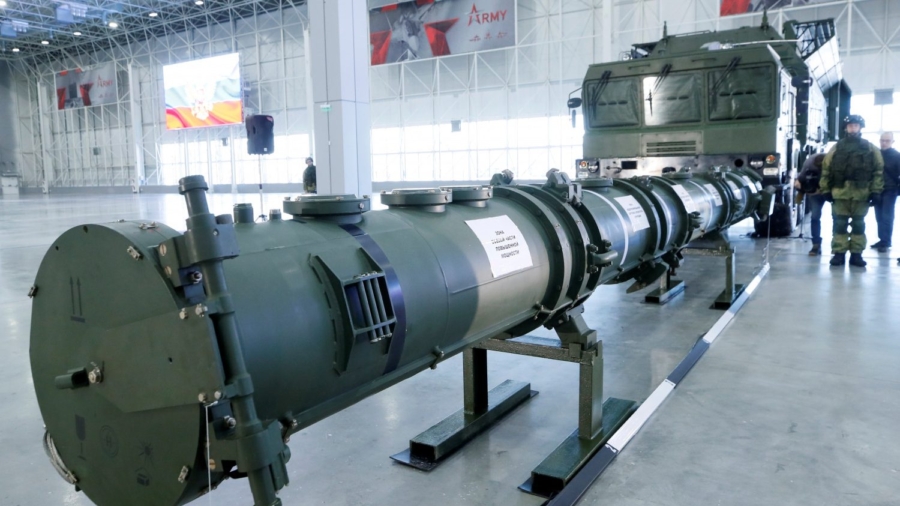The United States on Jan. 24 said Russia’s display of a secret missile did not prove that the nuclear-capable weapon is compliant with a 1987 arms treaty between the two nations.
Russian military officials unveiled the nuclear-capable Novator 9M729 missile to journalists and foreign military attaches on Jan. 23. Moscow used the display to assert that the missile falls six miles short of the 310-mile range prohibited by the Intermediate-Range Nuclear Forces Treaty.
Under Secretary of State Andrea Thompson told reporters on Jan. 24 that the United States has presented Russia “time after time after time” with data showing that the missile flew more than 3,000 miles during one of the tests conducted between 2008 and 2013.
“A static display of a missile cannot tell you how far a missile flies,” Thompson said.
Washington has presented Moscow with a plan for a “verifiable” test of the missile’s range. Thompson did not provide details of the test. Moscow countered the offer with its own unacceptable testing proposal, she added.
“They would have controlled the environment,” she said on the Russian plan. “When you go and select the missile and you select the fuel and you control all of those parameters, characteristics, you are controlling the outcome of the test.”

Washington has offered to hold arms control talks with Moscow during a United Nations meeting in Beijing next week, Thompson said.
Secretary of State Mike Pompeo on Dec. 4 gave Russia 60 days to return to compliance with the treaty. The 60 days will expire on Feb. 2, paving way for the United States to serve an official withdrawal notice. The pullout would be effective 60 days after the notice is served.
Thompson reiterated that the Trump administration will “suspend our obligations” under the disputed Intermediate-Range Nuclear Forces (INF) treaty if Russia fails to return to compliance by Feb. 2. But the move is “reversible” and Washington has made no final decision on announcing a full U.S. withdrawal, she said.
“I’m not particularly optimistic” that Russia will return to compliance, she told reporters at a breakfast.
The INF treaty, signed in 1987, prohibits Russia and the United States from possessing or testing short- and mid-range ground-launched ballistic missiles. The two nations destroyed their respective arsenals of these weapons after signing the pact.

According to Washington, Moscow has been in violation of the pact since the mid-2000s. Russia developed and deployed the missile systems covertly, according to Director of National Intelligence Dan Coats.
In addition to claiming that the missile is compliant with the treaty, Russia asserts that the United States is using the allegations as a pretext to exit the treaty and develop new missiles.
Both Washington and Moscow have concerns about China’s burgeoning missile arsenal. Unbound by the treaty, Beijing has developed and deployed a vast array of missile system which both the U.S. and Russia are prohibited from possessing.
In announcing his intention to withdraw from the INF, President Donald Trump mentioned that he hopes to replace the treaty with a pact that includes China. American officials have attempted to bring Beijing into the INF several times. Each attempt has failed.
Reuters contributed to this report.

